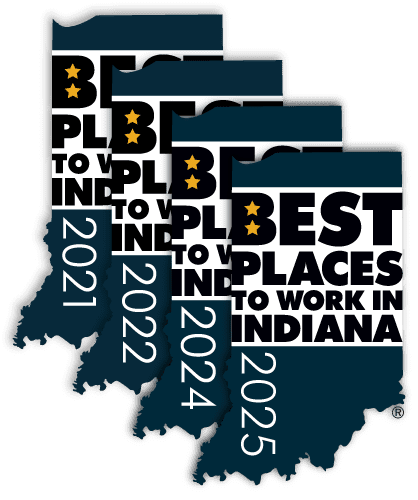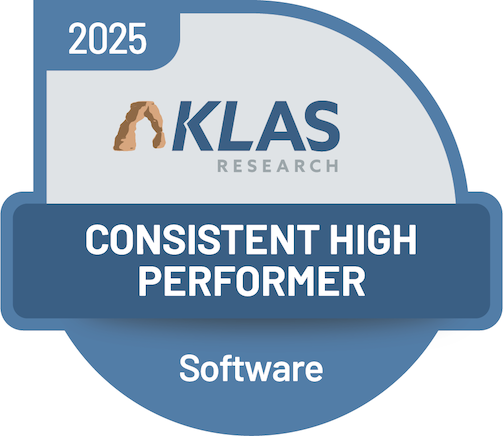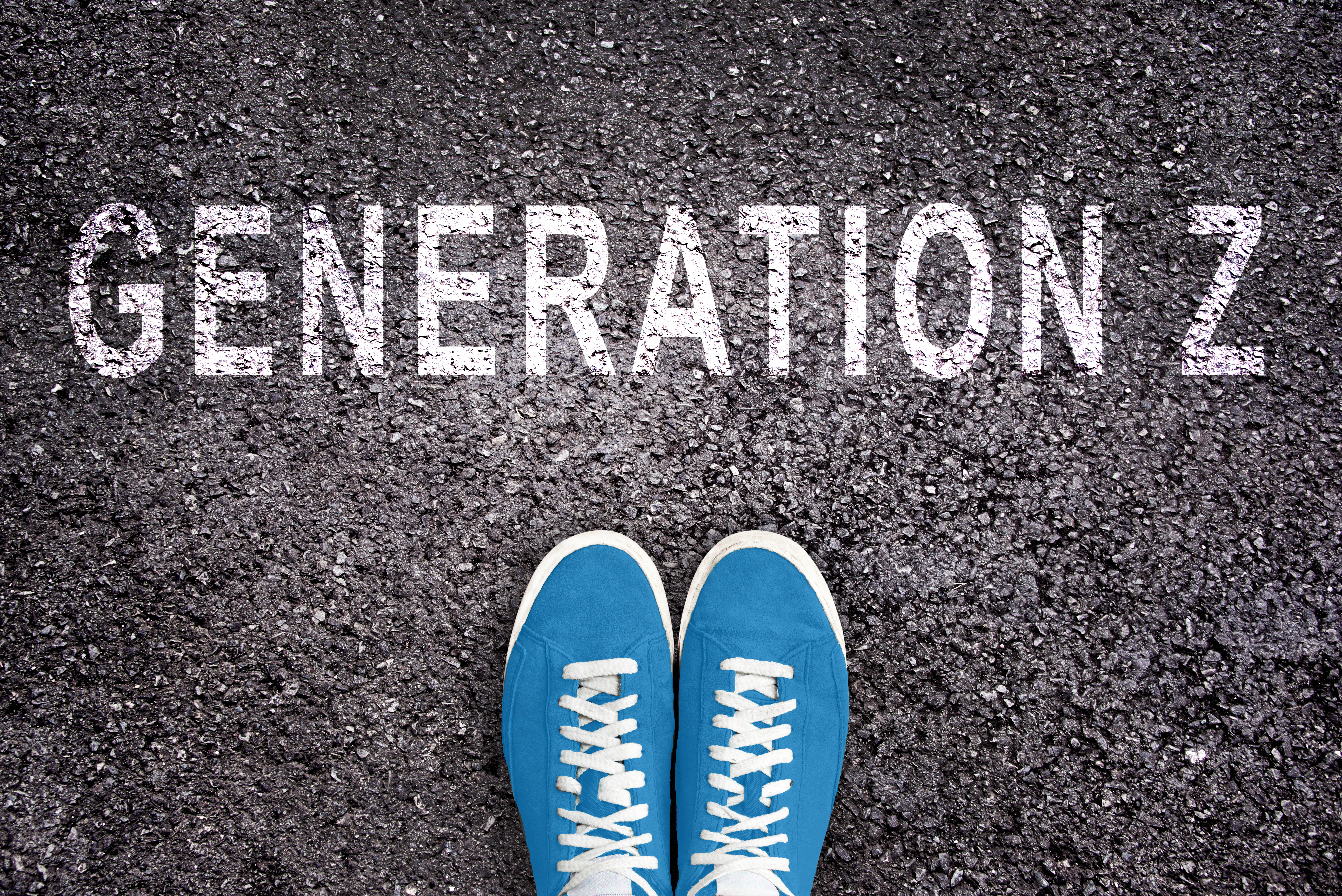
New Research on Gen Z Mental Health & Workplace Impact
Shaped by a global pandemic, economic instability, and relentless digital comparison, Gen Z is confronting unprecedented mental health challenges. While many grapple with anxiety and other conditions, they are also actively seeking solutions—turning to therapy, prioritizing well-being, and redefining what career success means.
46% of Gen Z Has Been Diagnosed with a Mental Health Condition
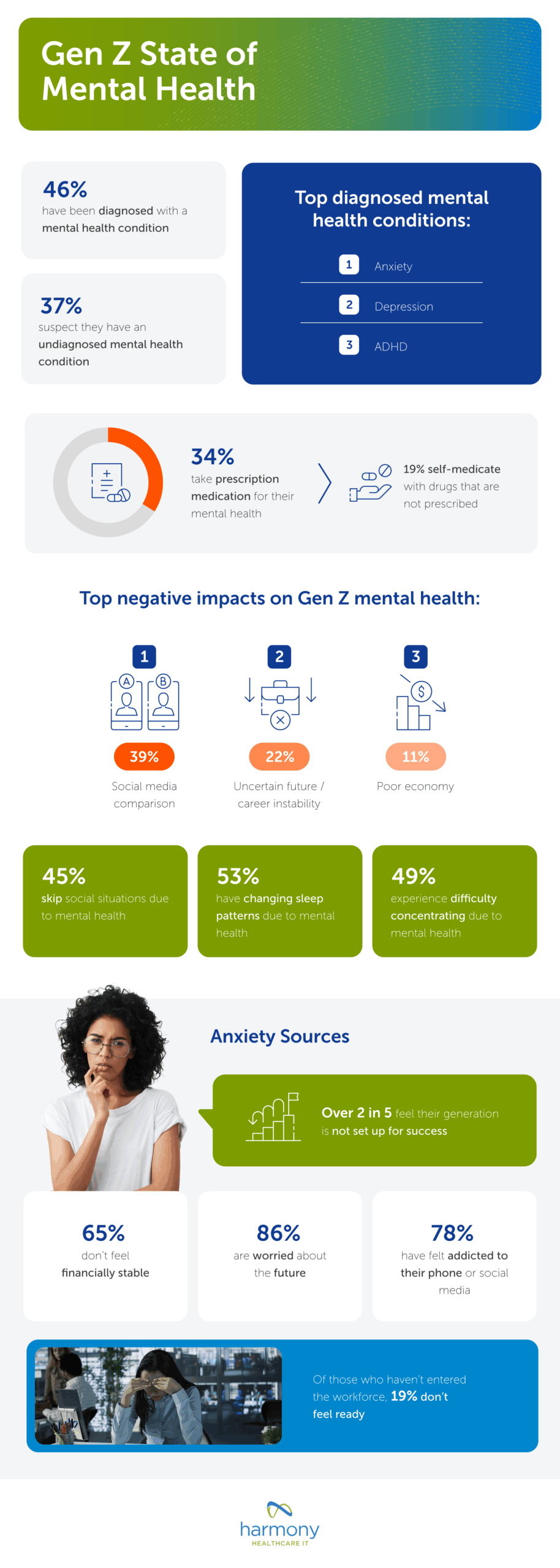
Mental health challenges are widespread among Gen Z, with nearly half (46%) having already received a formal diagnosis and more than a third (37%) believing they have an undiagnosed condition. Anxiety leads as the most common diagnosis, followed by depression and ADHD.
In response to these challenges, many Gen Zers are seeking pharmaceutical solutions. Over a third (34%) are currently taking prescription medication for their mental health, while an additional 19% report turning to non-prescribed drugs (such as cannabis) to manage their symptoms. The growing popularity of telemedicine may be a factor—our study on telehealth usage found that 60% of Gen Z prefers virtual care over in-person visits.
Why are they facing mental health struggles? When we asked Gen Z about the biggest negative impacts on their generation’s mental health, they reported:
- Social media comparison – 39%
- Uncertain future / career instability – 22%
- Poor economy – 11%
Mental Health’s Impact on Daily Life
Anxiety, depression, and other conditions can be exhausting, taking a toll on daily life and productivity. Over half of Gen Z (53%) report changing sleep patterns tied to their mental health, while 49% struggle to concentrate and 45% even skip social events.
Gen Z Anxiety Sources
It’s no surprise that anxiety is a top diagnosis for Gen Z – many of them are concerned about how they will function in adult society. More than 2 in 5 believe their generation isn’t set up for success, and 19% of those without jobs feel unprepared to join the workforce. Furthermore, 65% don’t feel financially stable.
While fear of the future is a primary source of anxiety, social media also plays a role. Nearly 4 in 5 (78%) admit they’ve felt addicted to their phone or social media. Our study on phone use found that Gen Z spends an average of 6 hours 27 minutes per day on their phones (the most of any generation).
Despite Diagnoses, Gen Z’s Mental Wellness is on the Rise
While much of Gen Z being diagnosed with mental health conditions, the outlook is positive – data finds that they are successfully managing their mental health struggles. Over half (54%) report having mostly good mental health days – a 21% increase since our post-Covid survey in 2022. Additionally, only 10% report having mostly bad mental health days – a 21% decrease from 2022 research.
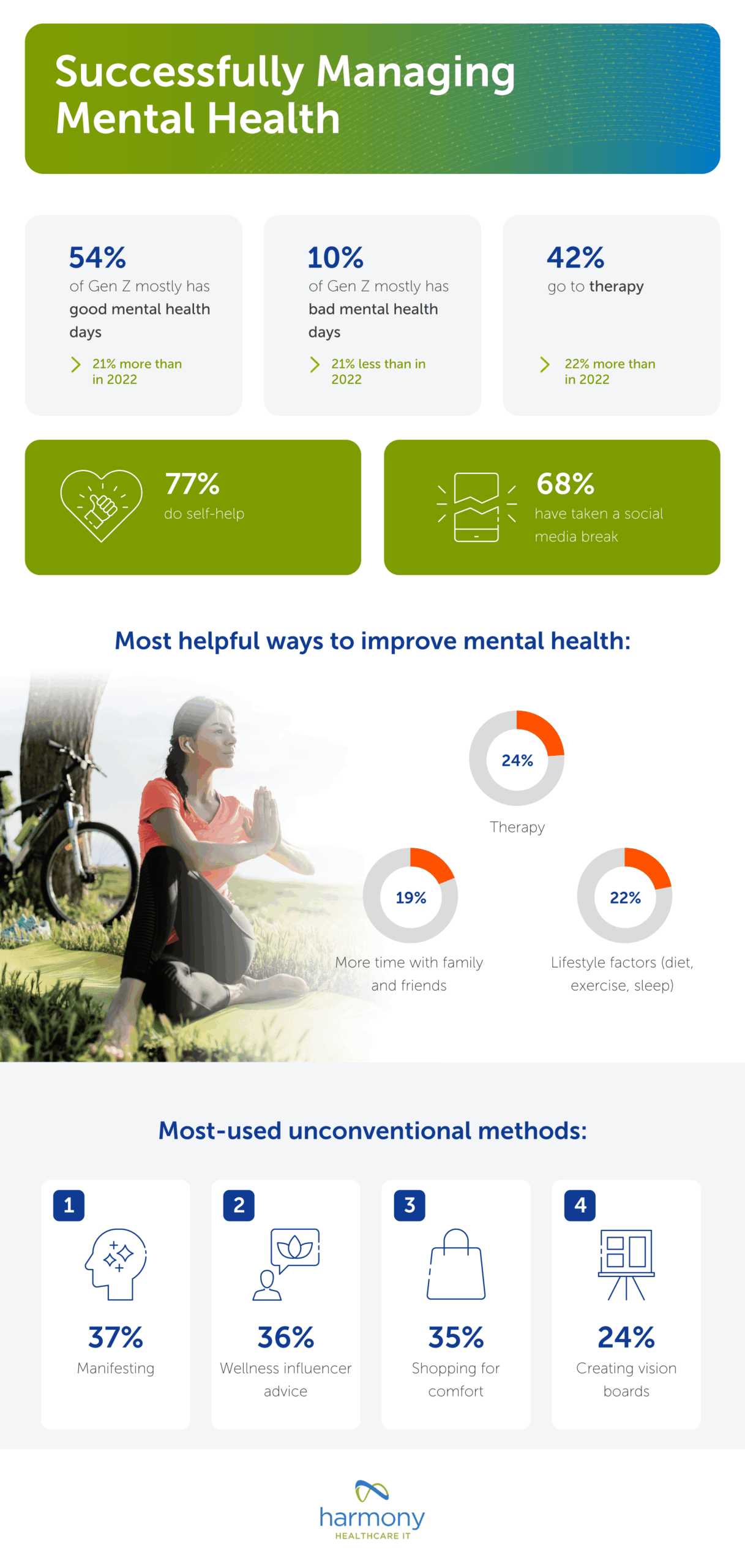
Coping Through Therapy and Self Help
The improvement in happiness could be largely due to therapy. Over 2 in 5 (42%) of Gen Z reports going to therapy, which is a 22% increase from 2022. Additionally, 77% report doing self-help, which includes books, journaling, and podcasts.
Gen Z reported the following methods as the most helpful for their mental health:
- Therapy – 24%
- Lifestyle factors (diet, exercise, sleep) – 22%
- More time with family and friends – 19%
Many have turned to new age coping mechanisms in addition to (or replacement of) traditional practices. Nearly 7 in 10 (68%) have taken a social media break for their mental health. Others tried unconventional methods such as manifesting (37%), wellness influencer advice (36%), shopping for comfort (35%), and creating vision boards (24%).
57% of Gen Z Disapproves of the 40-Hour Work Week for Mental Health
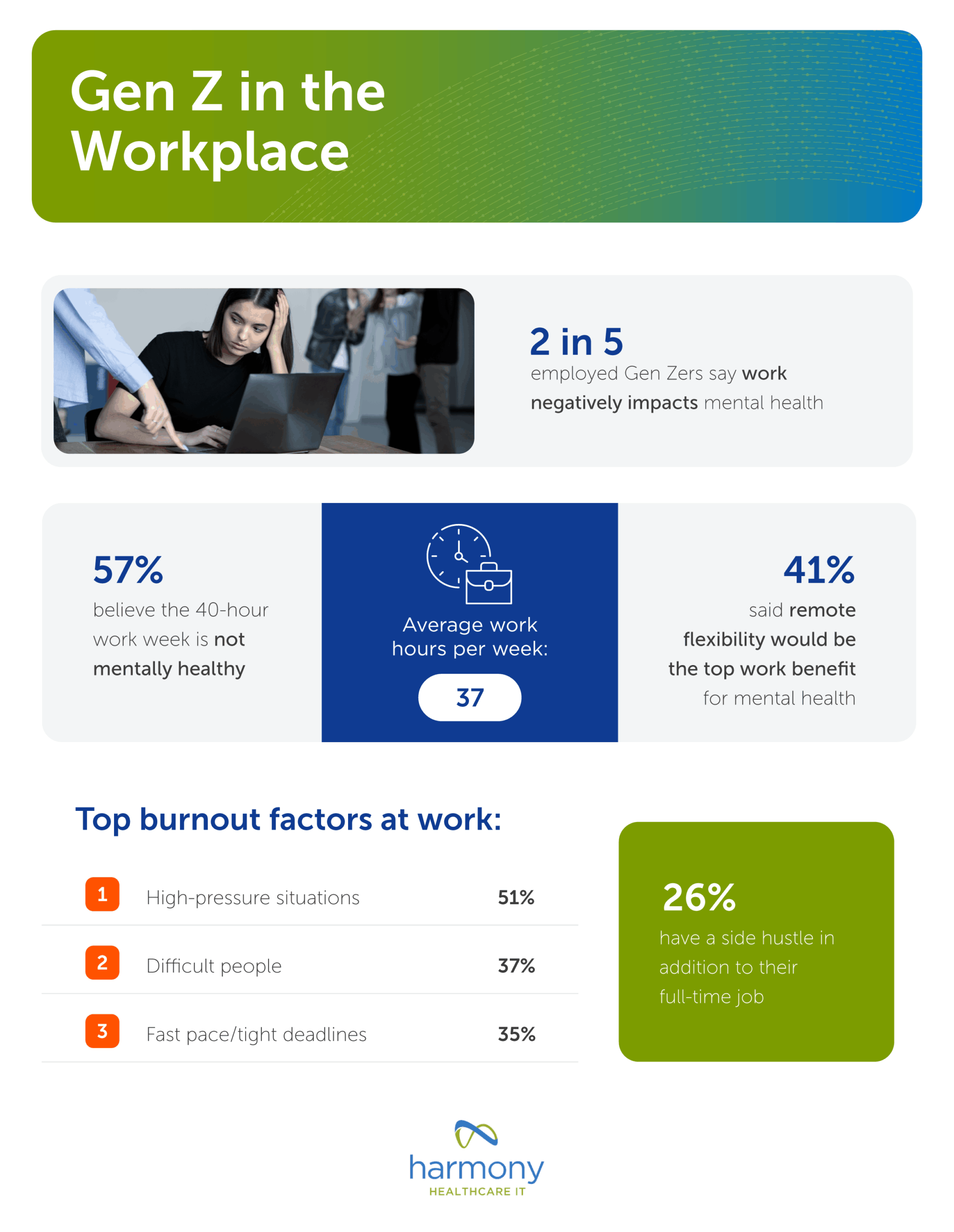
Gen Z has a unique outlook on the workday, prioritizing rest and flexibility over the 9 to 5 grind. They may, at times, feel like a fish out of water in rigid work cultures. Of employed Gen Zers, 2 in 5 say that work negatively impacts their mental health. Over half (57%) believe the 40-hour work week is not mentally healthy. On average, they work 37 hours per week.
Why is Gen Z Burnt Out at Work?
The vast majority of Gen Z (86%) reports being burnt out at work. While they are seemingly unhappy with the traditional work week structure, the top burnout factors include other aspects: high-pressure situations (51%), difficult people (37%), and fast pace/tight deadlines (35%).
When asked about the top benefit that would improve mental health, 41% responded with remote flexibility as their preferred perk.
Career Goals and Future Plans
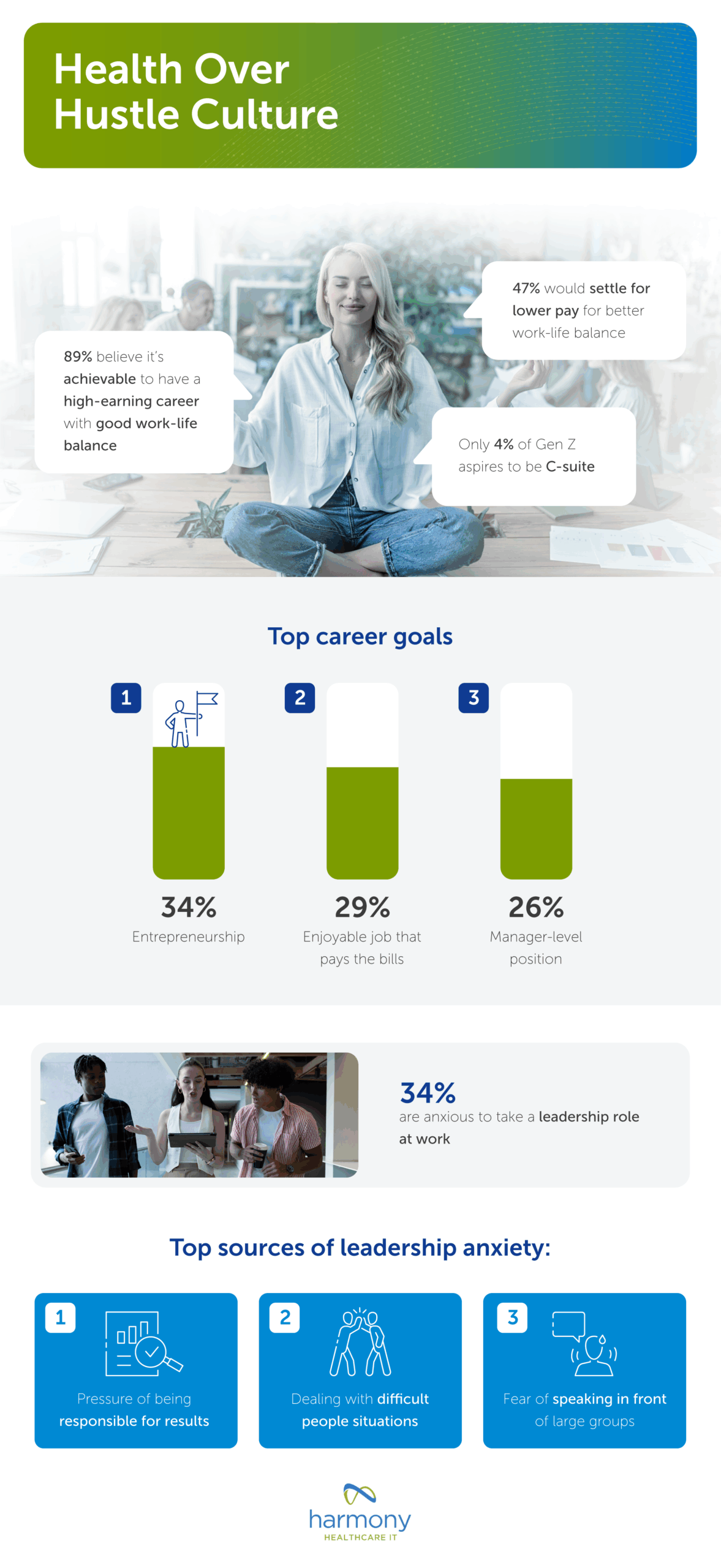
The corporate dream is changing: only 4% of Gen Z aspires to reach the C-suite. Instead, they are reshaping the career ladder, prioritizing mental well-being and sustainable success over status and salary.
A striking 89% believe it’s possible to have both a high-earning career and a healthy work-life balance, and nearly half (47%) say they’d accept lower pay if it meant better balance.
Top career goals for Gen Z include:
- Entrepreneurship – 34%
- Holding an enjoyable job that pays the bills – 29%
- Holding a manager-level role – 26%
Is Gen Z shying away from leadership roles out of fear? Over a third (34%) report feeling anxious about taking on leadership roles due to pressure to deliver results, navigating difficult interpersonal dynamics, and speaking in front of large groups of people.
Gen Z is facing serious mental health challenges—but they’re also taking proactive steps to manage them. From therapy and lifestyle changes to rethinking traditional career paths, this generation is prioritizing well-being in ways that could reshape the future of work and wellness.
Harmony Healthcare IT partners with healthcare organizations to manage legacy data through a consultative approach. We identify what data to migrate into new systems and securely archive the rest using HealthData Archiver®, AR Manager®, or our cold storage solution, HealthData Locker™.
Methodology
In May 2025, we surveyed 1,010 Gen Z Americans to ask them about their mental health. 40% were men, 57% were women, and 3% were nonbinary. Respondents ranged in age from 18 to 28 with an average age of 24.
For media inquiries, please contact media@digitalthirdcoast.net.
Fair Use
When using this data and research, please attribute by linking to this study and citing https://www.harmonyhit.com/.

